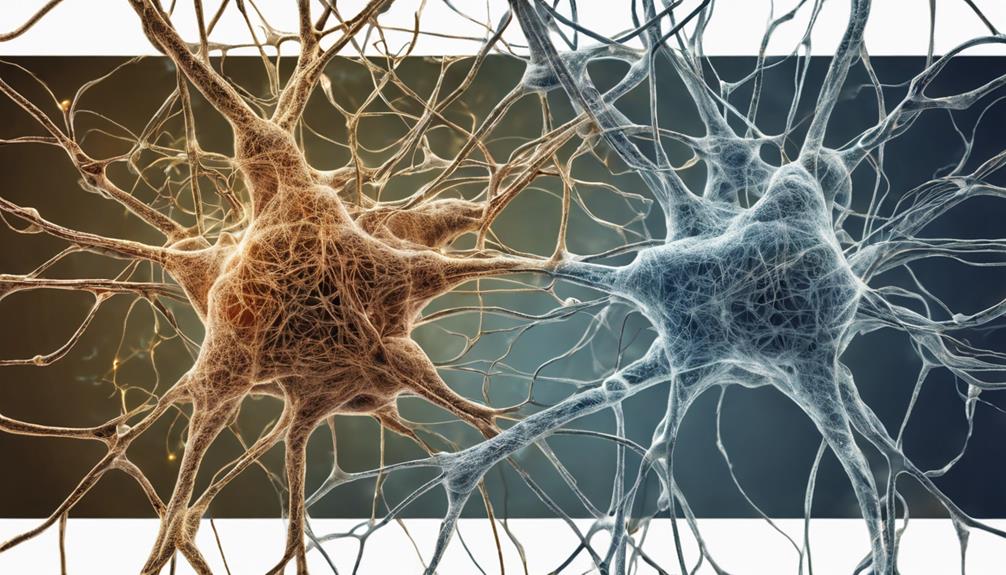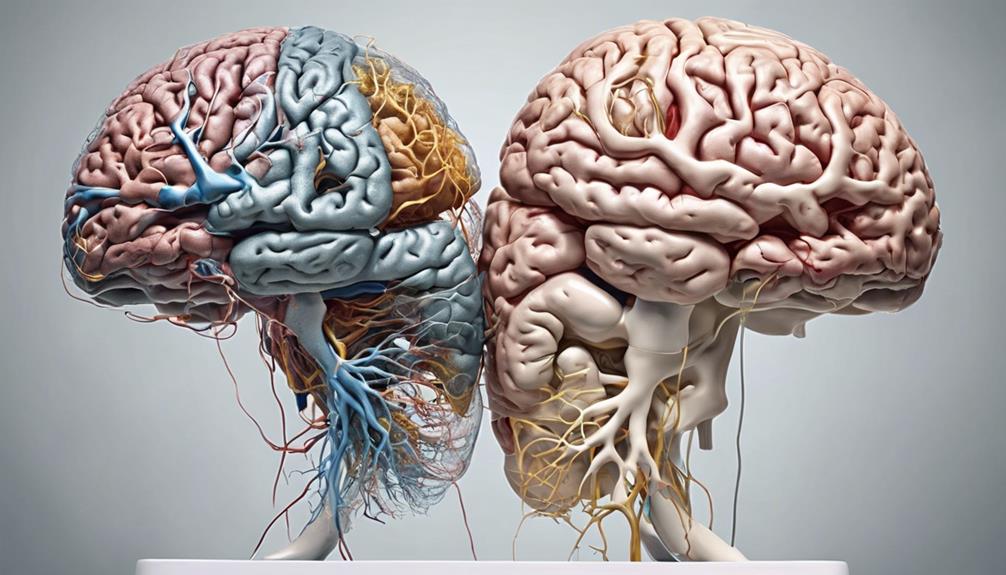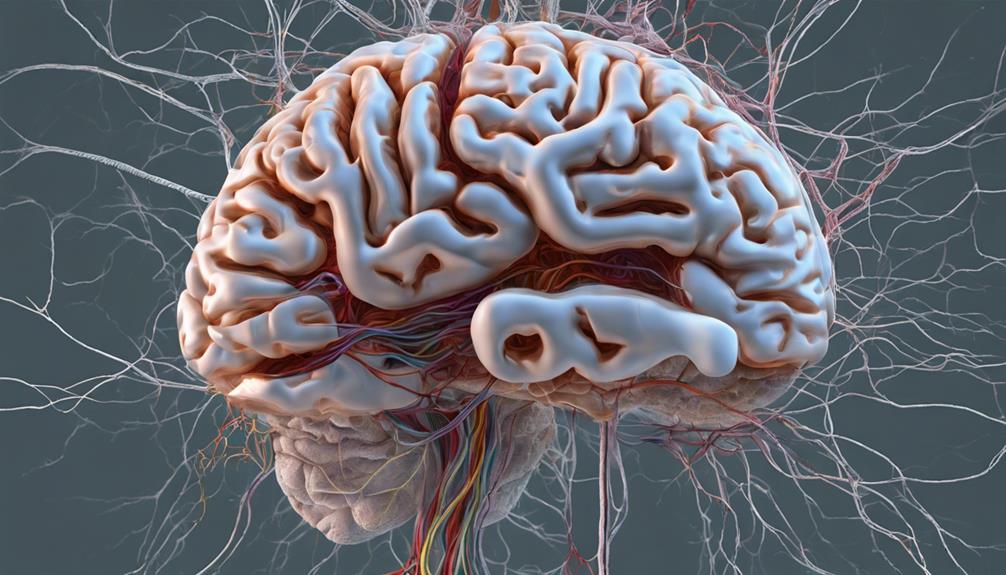A lot of individuals do not realize that dementia and Alzheimer’s are not synonymous, despite being frequently used interchangeably. Grasping the distinction between the two can provide insight into the intricacies of cognitive decline. It is essential to identify the subtle differences in symptoms, causes, and treatment methods for effective care and handling.
Let’s explore the distinct characteristics of dementia and Alzheimer’s to gain a deeper insight into these conditions and their impact on individuals and their loved ones.
Key Takeaways
- Dementia is an umbrella term; Alzheimer’s is a specific form.
- Alzheimer’s characterized by amyloid plaques and tau tangles.
- Diagnosing involves cognitive assessments, brain imaging, specialist consultations.
- Treatment includes medication management, cognitive therapies, lifestyle modifications.
Overview of Dementia and Alzheimer’s

Dementia and Alzheimer’s disease are neurodegenerative disorders that primarily affect older individuals, causing progressive cognitive decline and functional impairment. Dementia is an umbrella term that encompasses a range of symptoms affecting memory, thinking, behavior, and the ability to perform everyday activities.
Alzheimer’s disease, on the other hand, is the most common form of dementia, representing around 60-80% of cases. It’s characterized by the presence of amyloid plaques and tau tangles in the brain, leading to the gradual death of nerve cells and the breakdown of neural connections.
Understanding the differences between dementia and Alzheimer’s is crucial for providing appropriate care and support to individuals affected by these conditions. While dementia refers to a set of symptoms, Alzheimer’s is a specific disease with distinct pathological features. Proper diagnosis by healthcare professionals is essential to tailor interventions that can help manage symptoms and enhance the quality of life for those living with these conditions.
Symptoms of Dementia

The symptoms of dementia encompass a broad spectrum of cognitive, behavioral, and functional changes that significantly impact an individual’s daily life. These symptoms can vary depending on the type and stage of dementia but often include:
- Memory Loss: Difficulty remembering recent events or information.
- Communication Challenges: Struggling to find the right words or follow conversations.
- Impaired Judgment: Making poor decisions or having difficulty solving problems.
- Personality Changes: Becoming more irritable, agitated, or apathetic.
These symptoms can be distressing for both the individual experiencing them and their loved ones. It’s essential to recognize these signs early on to provide appropriate support and care.
Seeking medical advice for a proper diagnosis and developing a comprehensive care plan can help manage these symptoms effectively. As caregivers or healthcare professionals, understanding these symptoms is crucial in offering the best possible assistance and improving the quality of life for those affected by dementia.
Symptoms of Alzheimer’s

Experiencing memory loss, confusion, and difficulty completing familiar tasks are hallmark symptoms of Alzheimer’s disease. Memory loss often starts with forgetting recent conversations or events and progresses to forgetting important dates, names, and eventually faces of close family members. This can lead to individuals repeating questions or statements multiple times.
Moreover, confusion in time and space is common, causing disorientation even in familiar places. Tasks that were once routine, like cooking or managing finances, become increasingly challenging due to cognitive decline.
Language difficulties may arise, making it hard to find the right words or follow conversations. Individuals may struggle with visual-spatial issues, making it dangerous for them to drive or navigate their surroundings independently.
Changes in mood and personality can also occur, leading to increased irritability, suspicion, or withdrawal from social activities. These symptoms, when observed collectively, indicate a potential diagnosis of Alzheimer’s disease and require prompt medical attention for proper management and care.
Causes of Dementia

While various conditions can contribute to cognitive decline, understanding the underlying causes of dementia is crucial for accurate diagnosis and appropriate treatment. Dementia is a complex condition with multiple factors at play. Here are some of the primary causes:
- Neurodegenerative Diseases: Conditions like Alzheimer’s disease, Parkinson’s disease, and Huntington’s disease can lead to dementia as they progress and affect brain function.
- Vascular Issues: Stroke, small vessel disease, and other vascular problems can damage the brain’s blood supply, leading to cognitive impairment.
- Traumatic Brain Injury: Severe head injuries from accidents or falls can increase the risk of developing dementia later in life.
- Infections and Inflammation: Certain infections like HIV, as well as chronic inflammatory conditions, can impact brain health and contribute to the development of dementia.
Understanding these causes can help healthcare providers tailor interventions and treatments to address the specific underlying factors contributing to an individual’s dementia.
Causes of Alzheimer’s

Neurofibrillary tangles and amyloid plaques in the brain are key pathological hallmarks associated with Alzheimer’s disease. These abnormalities disrupt communication between nerve cells, leading to their dysfunction and eventual death. The exact causes of Alzheimer’s aren’t fully understood, but research suggests a combination of genetic, environmental, and lifestyle factors play a role in its development.
Genetic factors include mutations in certain genes like the amyloid precursor protein (APP), presenilin 1, and presenilin 2, which are linked to early-onset Alzheimer’s. Apolipoprotein E (APOE) gene variants also increase the risk of developing the disease. Environmental factors such as exposure to toxins or head injuries may contribute to the onset of Alzheimer’s.
Furthermore, lifestyle choices like poor diet, lack of physical exercise, smoking, and social isolation have been associated with a higher risk of Alzheimer’s. Chronic conditions like cardiovascular disease and diabetes are also believed to increase susceptibility to developing the disease. Understanding these causes is crucial for early intervention and effective management of Alzheimer’s disease.
Diagnosis and Evaluation

When diagnosing dementia or Alzheimer’s, a range of diagnostic tests is utilized to assess cognitive function and rule out other possible causes. These tests may include:
- Cognitive assessments
- Brain imaging scans
- Blood tests
Specialist consultations with neurologists or geriatricians are often necessary to confirm a diagnosis and determine the appropriate course of treatment.
Diagnostic Tests Used
Various diagnostic tests are utilized to assess and differentiate between dementia and Alzheimer’s disease. These tests help healthcare providers in making accurate diagnoses and developing appropriate treatment plans.
The following diagnostic tests may be used:
- Cognitive Assessments: These tests evaluate memory, thinking skills, and ability to perform daily tasks.
- Brain Imaging: Techniques like MRI and CT scans can reveal brain changes associated with Alzheimer’s or other forms of dementia.
- Blood Tests: Blood tests can help rule out other conditions that may cause dementia symptoms.
- Genetic Testing: In some cases, genetic testing may be recommended to identify specific gene mutations linked to familial Alzheimer’s disease.
These tests, when combined and interpreted by medical professionals, play a crucial role in the diagnostic process.
Specialist Consultations Required
Upon review of the diagnostic tests used to differentiate between dementia and Alzheimer’s disease, specialist consultations become imperative for a comprehensive diagnosis and evaluation of the patient’s condition. Neurologists, geriatricians, and neuropsychologists are essential in providing expertise in assessing cognitive function, conducting detailed medical history evaluations, and interpreting complex imaging studies such as MRI or PET scans. These specialists play a crucial role in ruling out other possible causes of cognitive decline, accurately identifying the specific type of dementia or Alzheimer’s, and developing personalized treatment plans.
Additionally, their input is invaluable in monitoring disease progression, adjusting medications, and offering support and guidance to both the patient and their caregivers. Collaborating with a multidisciplinary team of specialists ensures a thorough and accurate evaluation, leading to optimal patient care.
Treatment Options for Dementia

A range of pharmacological and non-pharmacological interventions are available for managing dementia symptoms. When addressing dementia, it’s crucial to consider various treatment options that can help improve the quality of life for individuals experiencing cognitive decline. Here are some key interventions to consider:
- Medication Management: Certain medications may be prescribed to help manage cognitive symptoms, behavioral changes, and sleep disturbances associated with dementia.
- Cognitive Stimulation Therapy: Engaging in activities that stimulate thinking, memory, and problem-solving skills can help maintain cognitive function and slow down the progression of dementia.
- Behavioral Therapies: Behavioral interventions such as cognitive behavioral therapy (CBT) can assist in managing challenging behaviors and improving communication skills for both individuals with dementia and their caregivers.
- Lifestyle Modifications: Encouraging a healthy lifestyle through regular physical exercise, balanced nutrition, social engagement, and adequate sleep can positively impact cognitive function and overall well-being in individuals with dementia.
Treatment Options for Alzheimer’s

When addressing Alzheimer’s treatment options, medication plays a crucial role in managing symptoms and slowing down the progression of the disease.
Cognitive therapies, such as reminiscence therapy and reality orientation, are also available to help individuals maintain cognitive function and quality of life.
Lifestyle interventions, including physical exercise and a balanced diet, are essential components in the overall management of Alzheimer’s disease.
Medication for Alzheimer’s
Effective treatment for Alzheimer’s disease typically involves a combination of medications aimed at managing symptoms and slowing down the progression of the condition. When considering medication options for Alzheimer’s, it’s important to consult with healthcare professionals to determine the most appropriate regimen.
Here are some common medications used in the treatment of Alzheimer’s:
- Cholinesterase Inhibitors: These drugs help improve communication between nerve cells.
- Memantine (Namenda): This medication regulates glutamate, a brain chemical involved in information processing, storage, and retrieval.
- Antidepressants: Sometimes prescribed to manage symptoms like depression or anxiety.
- Antipsychotic Medications: Used in some cases to address behavioral symptoms.
Consulting a healthcare provider is crucial to tailor the medication plan to individual needs.
Cognitive Therapies Available
In exploring treatment options for Alzheimer’s, one significant avenue to consider is the availability of cognitive therapies. Cognitive therapies aim to maintain and improve cognitive function, memory, and thinking skills in individuals with Alzheimer’s disease.
These therapies involve various techniques such as cognitive training, reality orientation, reminiscence therapy, and cognitive stimulation. Cognitive training focuses on specific cognitive tasks to enhance cognitive abilities, while reality orientation helps individuals stay connected to the present by providing orientation cues.
Reminiscence therapy involves discussing past experiences to improve mood and cognition. Cognitive stimulation activities engage multiple cognitive functions simultaneously. These therapies can be beneficial in enhancing quality of life and slowing cognitive decline in individuals with Alzheimer’s disease.
Lifestyle Interventions for Alzheimer’s
Lifestyle interventions play a crucial role in the comprehensive treatment approach for individuals diagnosed with Alzheimer’s disease. These interventions focus on promoting overall well-being and quality of life for both patients and caregivers.
Here are some key lifestyle interventions to consider:
- Regular Physical Exercise: Engaging in activities like walking, swimming, or yoga can help improve cognitive function and reduce the risk of cognitive decline.
- Healthy Diet: A diet rich in fruits, vegetables, and omega-3 fatty acids can support brain health and overall cognitive function.
- Social Engagement: Maintaining social connections and participating in group activities can help stimulate the brain and prevent isolation.
- Stress Management: Techniques such as meditation, deep breathing exercises, and mindfulness can help reduce stress levels, improving overall brain health.
Caregiving and Support

Caregiving for individuals with dementia or Alzheimer’s involves providing tailored support to address their specific needs and challenges. Understanding the unique symptoms and progression of these conditions is crucial for offering effective care. It’s essential to create a safe and structured environment, establish routines, and ensure proper medication management.
One must also focus on promoting independence while being ready to provide assistance when needed. Communication strategies play a vital role in caregiving, as individuals with dementia or Alzheimer’s may face difficulties expressing themselves. Patience, active listening, and non-verbal cues can facilitate better interactions.
Moreover, caregivers should prioritize self-care to prevent burnout and maintain their well-being. Seeking support from healthcare professionals, joining caregiver support groups, and utilizing community resources can offer valuable assistance. Continuous education about dementia and Alzheimer’s is fundamental for providing high-quality care.
Frequently Asked Questions
Can Dementia or Alzheimer’s Be Prevented Through Lifestyle Changes or Medications?
Yes, dementia or Alzheimer’s can potentially be prevented through lifestyle changes and medications. While there’s no guaranteed method to completely prevent these conditions, adopting a healthy lifestyle that includes regular physical exercise, a balanced diet, mental stimulation, and social engagement can help reduce the risk.
Additionally, certain medications may be prescribed to manage symptoms or slow down disease progression. It’s essential to consult healthcare professionals for personalized guidance.
Are There Any Alternative or Complementary Therapies That Can Help Manage Symptoms of Dementia or Alzheimer’s?
Like a gentle breeze soothing a restless sea, alternative therapies can offer comfort in managing dementia or Alzheimer’s symptoms. These treatments, such as music therapy or aromatherapy, can provide emotional support and improve quality of life for individuals affected by these conditions.
While not a cure, these complementary approaches can complement traditional medical interventions and enhance the overall well-being of those living with dementia or Alzheimer’s.
How Does the Progression of Dementia Differ From the Progression of Alzheimer’s?
The progression of dementia and Alzheimer’s differs in various ways.
Dementia is an umbrella term for cognitive decline, while Alzheimer’s is a specific type of dementia caused by brain changes.
In dementia, symptoms may progress gradually and affect various cognitive functions.
Alzheimer’s typically involves a more predictable pattern of decline, often starting with memory loss and advancing to broader cognitive impairments.
Understanding these differences can help tailor care and support strategies for individuals affected by these conditions.
Is There a Way to Predict Who Is at Higher Risk for Developing Dementia or Alzheimer’s?
Absolutely! Identifying individuals at higher risk for dementia or Alzheimer’s is crucial for early intervention. Various risk factors can contribute, such as age, genetics, lifestyle choices, and medical conditions.
What Impact Does Early Detection and Treatment Have on the Progression of Dementia or Alzheimer’s?
Early detection and treatment of dementia or Alzheimer’s can significantly impact the progression of the conditions. When identified promptly, interventions such as medication, therapy, and lifestyle changes can help manage symptoms, improve quality of life, and potentially slow down the advancement of the diseases.
Regular screenings and assessments are crucial in catching any cognitive decline early to provide the best possible care and support for individuals affected by these conditions.
Does Nose Picking Have Any Connection to Dementia?
Research on understanding how nose picking relates to dementia is still inconclusive. While some theories suggest that nose picking may be linked to cognitive decline, there is no concrete evidence to support this claim. It is important to consult medical professionals for accurate information on this topic.
Conclusion
In conclusion, understanding the difference between dementia and Alzheimer’s is crucial for proper diagnosis and treatment.
Dementia is like a complex puzzle with various pieces, while Alzheimer’s is like a specific piece of that puzzle.
Both conditions require careful evaluation and personalized care to address the unique needs of each individual.
By recognizing the distinctions between the two, we can better support those affected and improve their quality of life.










